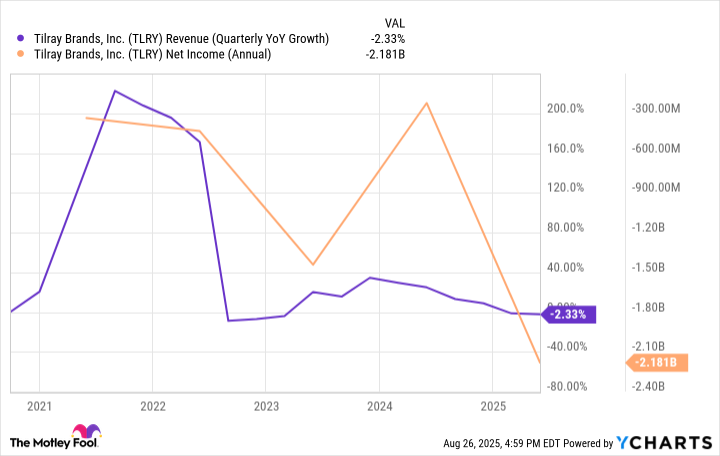Penny stocks — companies trading under $5 per share — tend to be that cheap for a reason: The market doesn’t have much faith in them. However, there is the occasional penny stock that, against most odds, manages to soar past those levels and deliver market-beating returns to investors who got in when it was still changing hands for pocket change. The challenge is to separate the wheat from the very abundant chaff.
With that said, let’s consider one penny stock, Tilray Brands (TLRY +0.07%), that has taken its shareholders on a volatile ride over the past five years. Is the company cheap at current levels, or is it a stock investors should stay far away from? Let’s find out.
Image source: Getty Images.
The bull case for Tilray
Tilray Brands is the leading player in the Canadian cannabis market in terms of revenue. It maintained the top spot during its fiscal 2025 year, which ended on May 31. The company’s portfolio includes products across several categories, from pre-rolls to vapes and cannabis-infused drinks. Further, Tilray has significantly expanded beyond its core operations over the past few years. The company’s portfolio is now well-diversified across cannabis, hemp-based wellness products, the resale of pharmaceuticals, and significant craft brewing operations in the U.S.
During fiscal 2025, Tilray’s revenue increased by 4% year over year to $821.3 million. Tilray’s beverage business performed particularly well, growing its sales by 19% year over year to $240.6 million, and now making up 29% of the top line versus 25% in the previous year.
Although revenue growth is still not that strong — and Tilray remains unprofitable — those bullish on the stock might point out that the company could benefit from regulatory progress in the cannabis industry. Tilray’s shares recently soared on news that President Trump was considering reclassifying cannabis from a Schedule 1 to a Schedule 3 substance.
Those that are in the former category are considered to be more dangerous and have a higher potential for abuse. This change, if implemented, could enable Tilray and its peers to secure funding more easily than they have been able to so far and help them expand their operations. Tilray’s CEO, Irwin Simon, even predicted that full-blown marijuana legalization would happen at the federal level by the end of Trump’s presidency.
Tilray already has significant operations in the cannabis and craft brewing markets in the country, including a solid, established distribution network. The company would use that to hit the ground running faster than smaller competitors if legalization does happen. Lastly, Tilray also has significant operations in other countries, including Germany, and could also benefit from loosening regulations abroad. Germany recently made some progress toward that when it allowed recreational use of cannabis for adults last year.
Tilray’s established brands and significant footprints in the industry could help it benefit if the cannabis sector takes off in the long run.
Is it worth taking a chance?
Why have Tilray’s shares performed as poorly as they have over the past few years despite the opportunities available to the company? There are several reasons. First, even as regulators have loosened restrictions on recreational cannabis, this has not necessarily translated into a significant market opportunity. For instance, although cannabis use is now legal for adults in Germany, it remains illegal for retailers to sell the substance. People have to grow it at home or buy it from a cannabis club they join. Clubs are only allowed to sell it to their members and have to operate as nonprofit organizations.
Even if President Trump does decide to reclassify cannabis in the U.S., this might not lead to a significant rise in demand for marijuana. Second, even if there is a market opportunity resulting from legalization or less stringent regulations, laws can still be in place that restrict this opportunity.
In the U.S., reclassification wouldn’t fix the fact that it’s illegal to transport cannabis products across state lines. In Canada, legalization was accompanied by a range of other regulatory requirements, including the need to obtain proper licenses. This slowed down the progress of cannabis companies in the country.
Third, legalization has invited significant competition before, and it will again if it happens in the U.S. While Tilray has managed to become the top player in Canada, this has come at a cost. It has achieved this partly through acquisitions; however, since it remains unprofitable, it has also had to issue new shares to help fund its acquisition spree, resulting in dilution for existing shareholders. Lastly, the company’s performance in the past five years hardly inspires confidence. Tilray’s revenue growth has been volatile, and profitability remains elusive.
TLRY Revenue (Quarterly YoY Growth) data by YCharts
Of course, that’s in the past. It does not mean the company will continue to struggle in the future. However, when we consider that, along with all the other headwinds the company will face in the industry, the cannabis specialist looks unlikely to recover. So, Tilray isn’t a cheap stock since those who invest in the company today could be left with worthless shares in five years or so. Investors should steer clear of the company.
Great Job newsfeedback@fool.com (Prosper Junior Bakiny) & the Team @ The Motley Fool Source link for sharing this story.





